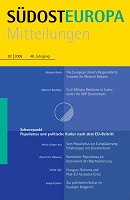Hungarian Politics in the Early 21st Century: Reforms and Post-EU Accession Crisis
Hungarian Politics in the Early 21st Century: Reforms and Post-EU Accession Crisis
Author(s): Attila ÁghSubject(s): Politics / Political Sciences
Published by: Südosteuropa Gesellschaft e.V.
Summary/Abstract: East-Central European (ECE) countries are facing a period of post-accession crisis that has taken the EU politicians and experts by surprise. In fact, these latest developments have come of necessity from the double pressure of the new EU requirements and the unfinished “home work”, the missing social transformation in the new member states. ECE states have to complete their membership inside the EU as they did in case of joining the Schengen zone at the end of 2007, but the accession to the Euro zone is still ahead of them and they are also rather far from meeting the goals of the Lisbon strategy. The paper focuses on the recent developments in Hungary after the latest elections in April 2006, namely on the efforts of the Gyurcsány government to introduce major reforms in order to remove the roadblocks to the rapid catching up process within the EU. It concludes that the uphill battle for radical reforms is mostly over and the government in the second half of the cycle has a good chance of consolidating the ongoing reforms. Overcoming post-accession crisis completely, however, is still further down the road after 2010.
Journal: Südosteuropa Mitteilungen
- Issue Year: 2008
- Issue No: 02
- Page Range: 68-81
- Page Count: 14
- Language: English
- Content File-PDF

